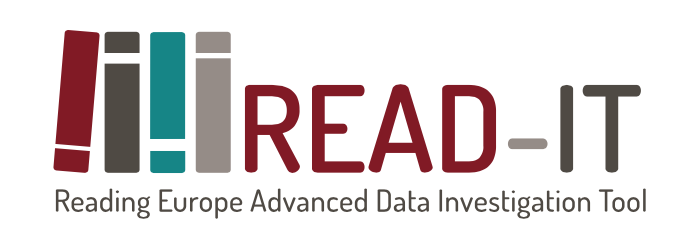Project facts
Presentation
READ-IT is a transnational, interdisciplinary R&D project that is building a unique large-scale, user-friendly, open access, semantically enriched investigation tool to identify and share groundbreaking evidence about the 18th-21st century Cultural Heritage of reading in Europe.
The corpus encompassed is a rich “human archive” in multiple media and languages depicting a transaction between reading subjects and reading material. Yet it is currently scattered and insufficiently labeled, thus untraceable. Without gathering, describing and structuring, it will remain unknown. Innovative tools are also needed to leverage community and critical engagement with this crucial common heritage, thereby preserving and enriching it.
READ-IT will ensure sustainable and reusable aggregation of qualitative data allowing an in-depth analysis of the Cultural Heritage of reading. State-of-the-art technology in Semantic Web and information systems will provide a versatile, end-users-oriented environment enabling scholars and ordinary readers to retrieve information from a vast amount of community-generated digital data leading to new understanding about the circumstances and effects of reading in Europe.
Check out a PowerPoint presentation about the project: READ-IT JPI March 2021
Project Leaders and PIs
Project Leader: Prof. Brigitte OUVRY-VIAL Université du Maine Le Mans France
Principal Investigator 2: Dr. Shafquat TOWHEED The Open University Milton Keynes United Kingdom
Principal Investigator 3: Dr. José DE KRUIF Universiteit Utrecht Utrecht Netherlands
Principal Investigator 4: mag. Dr. Michael WÖGERBAUER Institute of Czech Literature – Czech Academy of Sciences) Prague Czechia
Principal Investigator 5: Dr. Guillaume GRAVIER CNRS-IRISA Rennes France
Project Associate Partners
AP1: Queen Mary University London, London, UK. Contact person: Prof. Matthew Rubery
AP2: University of Münster, Münster, Germany. Contact person: Prof. Dr. Corinna Norrick-Ruehl.
AP3: Université François Rabelais, Tours, France. Contact person: Dr. Gustavo Gomez-Mejia
AP4: Universita Degli Studi di Milano, Milan, Italy. Contact persons: Prof. Dr. Lodovica Braida, Prof. Dr. Damiano Rebecchini.
Impacts & Results
The interdisciplinary collaboration between established digital humanists, human & social sciences scholars and computer researchers will investigate innovative ways of gathering new resources through crowdsourcing and web-crawling as well as linking and reusing preexisting datasets. Extracting descriptors from a sample of multilingual textual sources will contribute to a robust ontology as well as to multiple thesauri of invariants accounting for the lowest common denominator of European reading experiences across times and cultures.
READ-IT will maximize research outputs and foster further active engagement with the digital Cultural Heritage of reading in Europe through “beyond the state of the art” smart APIs and user interfaces designed for the co-curation of personal collections and memories of reading. It sheds light on the societal impact of digitally mediated knowledge and of public engagement with the Cultural Heritage of European print culture.
The project team has created a number of resources available through their website, which is updated with project news regularly. You can take a look at our Annotation Tool which will be released in open accesss by June 2021. You can also follow READ-IT project developments on GitHub.
For scholars and the broader public interested in understanding and sharing the importance of reading, for our common cultural identities, as well as well-being, we are pleased to present our multi-language Contribution Portal and Chatbot. Through these assets the project team aims to learn about public reading habits, memories and experiences and to foster further research on Why and How people read in Europe, in the past and today.
The chatbot is available in a number of languages on both the Telegram app and in your web browser. Details and links to the various chatbots and portal assets can be found on our website. Follow us on Twitter for updates on project developments, current activities and events. Our Twitter account is @eureadit.

